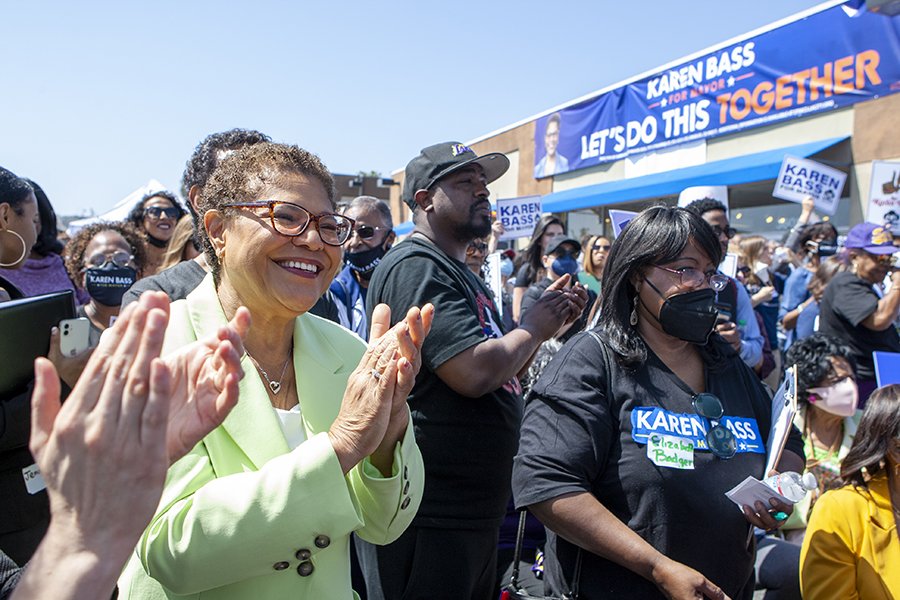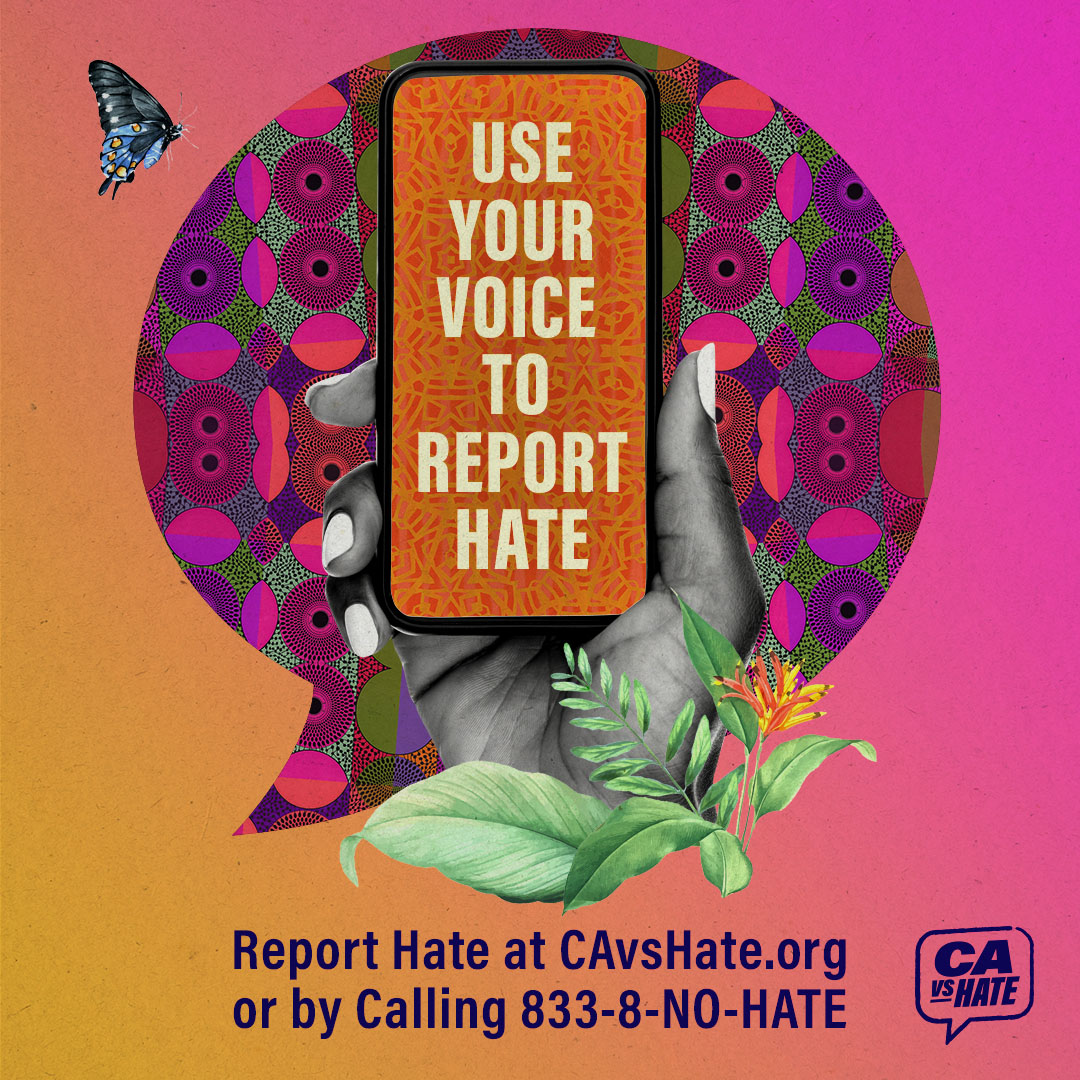Homelessness, affordable housing, crime, and supporting local small business are some of the pressing issues in Black communities of Los Angeles.
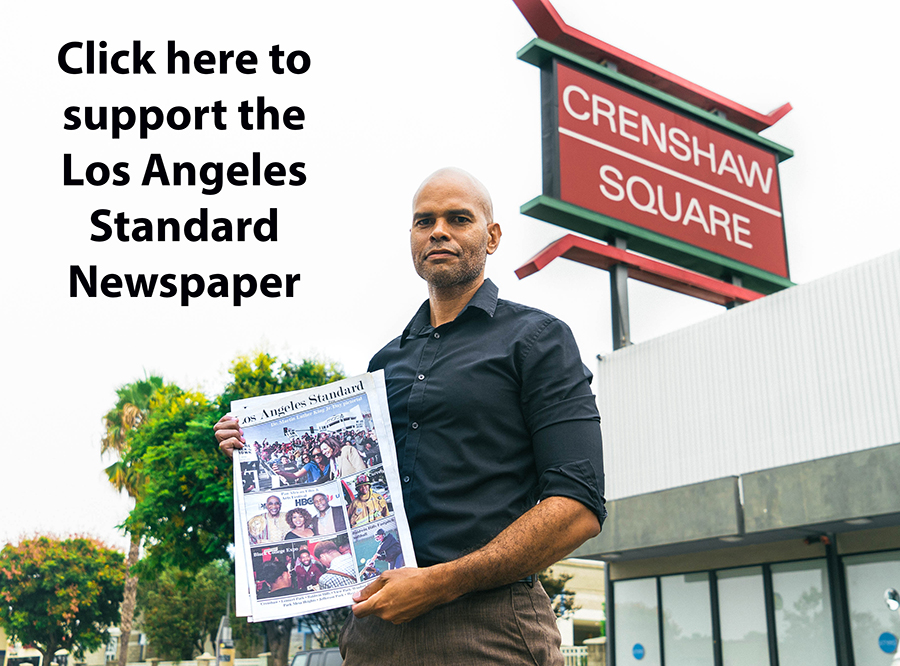
By Jason Lewis
Congresswoman Karen Bass (37th Congressional District- South Los Angeles, Mid City Los Angeles, West Los Angeles, and Culver City) is in a close race with real estate developer Rick Caruso, who is the developer and owner of The Grove, to become the mayor of Los Angeles. In June’s primary election, Bass received 43.1 percent of the vote to Caruso’s 36 percent of the vote.
Since this past spring, Bass has held three media roundtable discussions with local Black media outlets, where she answered a wide range of questions about Los Angeles’ homelessness and housing crisis, crime, and small business. The Standard contacted Caruso’s office for an interview but did not receive a response.
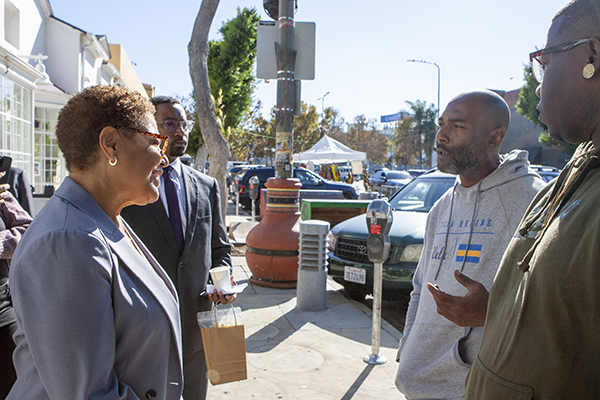
Crime
Since the COVID-19 pandemic, Los Angeles has seen a rise in crime. The typical solution for Black communities is to send more police officers, but Bass is looking to take a different approach.
“My beef for 32 years (when Bass founded Community Coalition) is that we invest in law enforcement and incarceration, but we do not invest in prevention,” she said. “Politicians don’t like to promote prevention, because it means that something didn’t happen. You’re much more electable if you can say, ‘Well I’m going to pass a law that locks people up.’ That’s much more effective in terms of a campaign than to say, ‘I’m going to put a lot of money into preventing something.’
“We know that you can’t arrest your way out of this. We tried it. We did it all through the ‘90s. We arrested everybody under the sun, but that didn’t work out very well for us.”
Since founding Community Coalition in 1990, Bass has supported gang prevention and intervention programs, which many believe curb crime more than a stronger law-enforcement presence.
“The basis of forming the Community Coalition in 1990 was that we had, not an uptick in crime, we had a massive increase in crime,” she said. “A thousand homicides, the crips, the bloods, crack, etc. My concern then was that the only solution that policy makers were putting forward was just arresting everybody. They weren’t looking at the root causes, and the root causes then, as now, substance abuse was a health issue and needed to be addressed in that manner. And I saw gang violence and gang involvement as a social and an economic issue. The work that was started in the ‘90s by Community Coalition and other organizations around town, that work has now been researched, it has been documented to reduce crime, and it has been professionalized. And it is counter to a perspective this just says, ‘law and order,’ which is just a philosophy that I believe attempts to arrest your way out of a problem. It historically has cast a wide net on our communities. That wide net has captured people who do not need to be in that net. They either did not commit crimes, or they were involved in very petty situations that wind up going on that trajectory of the criminal justice system.”
Taking up a child’s time with after school programs in arts, music, education, STEM, and sports also helps curb crime because they are less likely to join gangs or participate in various types of illegal activities. After school programs can also lead teenagers away from making other poor life decisions.
“Juvenile delinquency is from 3 p.m. to 7 p.m., and teenage pregnancy is from 3 p.m. to 7 p.m.,” Bass said. “If you can keep girls occupied until the evening when their parents get home, you will significantly reduce teen pregnancies. One of the things that I want to push for on the youth part is to collaborate with the LAUSD because in American culture, we see childcare ending around 5th grade. You have to have after school programming that goes up to the 12th grade. If you can keep the kids busy until their parents get home, you can alleviate a lot of problems.
“Kids get involved in gangs for a variety of reasons, but if you give them an alternative where they feel safe, they’ll gravitate toward it immediately.”
Gang intervention and after school programs are underfunded in comparison to law enforcement agencies. While Bass is not looking to defund the police, she believes that properly funding those programs can have a greater impact on the crime rates.
“My belief is that when a crime is committed, you obviously have to deal with that and the person has to be held accountable,” she said. “But while we have to do that, I want to invest a tremendous amount of resources into preventing future crimes. Not just focusing on the crime of today, but on what we can do in our community to prevent future crimes.”
While in congress, Bass has secured several hundred thousand dollars of federal funds for gang intervention programs in South Los Angeles, and she’s working to bring in millions of dollars more before she leaves her office.
“I want to make a very serious investment in their work,” she said. “They do incredible work. I do not feel that they get the due that they need. I want to raise their wages, and they need access to mental health services because they are constantly immersed in trauma.”
Bass has been at the forefront of the criminal justice reform movement on the federal level, and she has plans for Los Angeles residents who were formally incarcerated to insure that they are not repeat offenders and so that they are employable.
“As we have reduced the number of people who are incarcerated, we don’t have anything for them, which is why many of them come out and live in tents,” she said. “I really want to focus on re-entry services.”

Homelessness
“The biggest motivation for me not to run for Congress and to come home is because of the disproportionate rate in which we (Black people) are unhoused,” Bass said. “We’re nine percent of the population. Before the last count we were 40 percent unhoused. Those are horrific numbers. This is the No. 1 reason why I’m running.
“We are 40 percent of the people in tents. Thirty percent are Latino. With 70 percent of the people in those tents being Black or Brown, and people being so frustrated now, I’m worried that the direction the we could go in, that’s a more conservative direction, would be amounting to sweeping them up and locking them up.”
Like many Los Angeles residents, Bass finds it outrageous that people are living on the streets, and she has a multi-layered plan to solve the issue.
“I want to see a robust program that No. 1, targets and prevents people from becoming homeless,” she said. “No. 2, when they do become homeless, that they are off of the streets ASAP. No. 3, that they are in temporary housing. No. 4, those people who need it are in permanent supportive housing. No. 5, those people that are in permanent supportive housing cycle out of that and are mainstreamed back into the housing market. Now there will be a percentage of people who will need permanent supportive housing for their whole lives, and that’s people who are profoundly mentally ill. The majority of people who suffer from mental illness, they don’t need to be housed for the rest of their lives. They need to be stabilized.”
Bass’ plan is to considerably decrease the homeless population by the end of her first term.
“The public will see that it is ending,” she said. “In other words, that we have made significant differences. Encampments will be gone. People will be housed. There will be an adequate conveyor belt. Because that’s one of the things that hasn’t happened.
In the fall of November 2016, the city of Los Angeles approved Measure HHH, which raised approximately $1.2 billion to build housing for the homeless. The following spring the county of Los Angeles passed Measure H, which would raise funds for homeless services and prevention. But since those measures were passed, the homelessness problem has gotten worse.
“I think that the ballot initiatives have struggled because there were some things that they didn’t think about when they put it together,” Bass said. “For example, when the ballot initiatives were voted on, the homeless population is 50 percent more today than it was then. The other thing is that the ballot initiative only allowed for new construction. I think that was a mistake. It should have allowed for rehab or adaptive reuse (converting motels into housing), but it didn’t. And three, it didn’t consider the bureaucratic mess that the city is in. You have to go to 12 different departments to get anything approved. I want to do some restructuring of the bureaucratic process so that things can be streamlined. The other thing that the ballot initiative didn’t take into account is how long it takes to build something with public money. One thing that would have been good is if they had raised a pool of private dollars that developers could have borrowed from while they were waiting for their public money to be approved. That’s why it’s taken so long. It isn’t true though that nothing hasn’t been done. I think housing has been built, but it has not been built fast enough.”
Bass said that she would not halt any projects that are already in the pipeline, but she would make major changes to the system.
“I would go in a different direction because I believe that the city and the county need to be completely aligned,” she said. “When HHH was passed it only allowed for new construction. What should of happened was that it also should have allowed for renovation. Changing a motel or a hotel over into housing. Changing a commercial building into housing. Proposition HHH did not allow for that.”
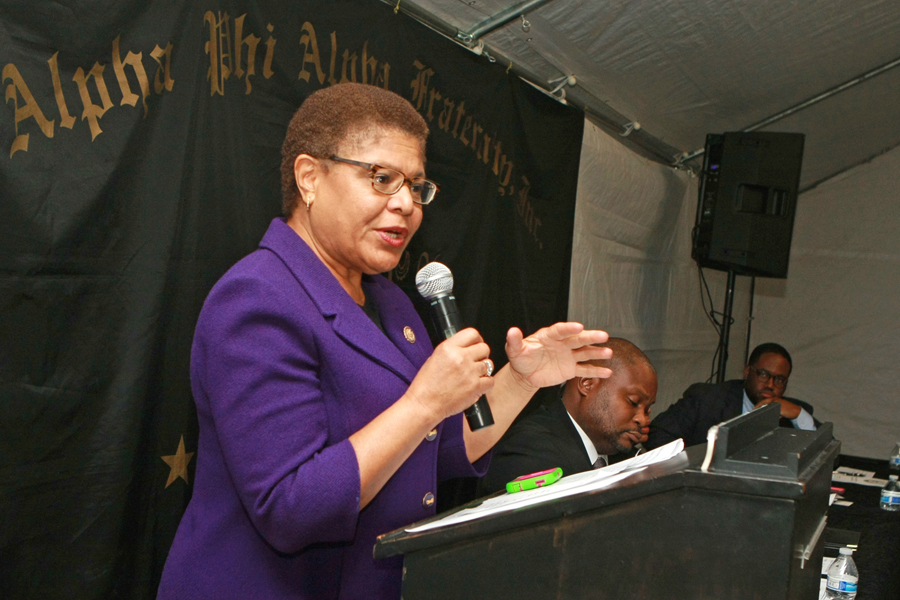
Affordable housing
The rising costs to purchase or rent housing in Los Angeles is pushing many employed people out of the city. With gentrification, this issue has hit Black neighborhoods hard.
“L.A. has become unaffordable,” Bass said. “Many of our adult children can’t even afford to live here anymore.
“The housing market in general is of tremendous concern to me. The rents are so high that people have to live with two and three families. A lot of people are leaving L.A.”
Bass said that the solution is to build more housing, which is currently happening. There are new housing developments throughout the city, especially along Crenshaw Boulevard near the new Metro K Line stops. But the new housing has not lowered the rent. While developers promote affordable housing, the cost to rent is still not affordable for the long-term residents in those communities.
“When people talk about affordable, I don’t really know what they mean,” Bass said. “Affordable to who?
“We need more affordable housing built in the city. There’s a report that says that L.A. needs 500,000 units over the next 10 or 15 years. So a lot of building needs to happen. And one of the things that absolutely has to happen in order for any of us to be successful is that we’re going to have to disrupt, shake up, and streamline the bureaucracy. Because that’s one of the reasons why the price to build housing is so expensive.
“I would have one individual, who is accountable to me, in charge of restructuring the permitting and building process. For example, you have to go to like 10 different offices for approvals. That’s the type of stuff that drives up the costs of housing.”
Small Business
Roughly 97 percent of Black-owned businesses are sole proprietorships with one to three employees, and financing is typically their biggest issue.
“I want to meet with the financial institutions and develop a pool of resources,” Bass said. “The first thing small businesses say is ‘access to capital.’ I think that we have all the wealth in the world in this city, but we need to put it to play. A fund that a small business can borrow from, micro loans or more, so that we can grow our business.”
Bass said that she would hire a deputy mayor for business that would help small businesses participate in city programs.
“There are all kinds of business opportunities and I want us to grow our small businesses,” she said. “First of all strengthen the ones we have and grow them. For example, the city procurement. There’s 10s of millions of dollars that goes to small businesses in other states to do business here. There needs to be a priority here.”
Experience
Bass served as the as a California State Assemblymember from 2004 to 2010, where she served Black communities in Los Angeles, as well as other communities in the city. She has served in Congress since 2011. She plans to use her political expertise if she is elected mayor, especially in securing financial resources.
“I know how the state legislative process works, and I have the relationships on the state level,” she said. “What I’m going to be looking at, more than anything is… give me the money. The state has a $100 billion surplus. The governor and the legislature have been generous in terms of giving us a lot of money to address the No. 1 issue, which is homelessness. But we’re going to need more. We’re also looking at some regulatory relief that will allow us to expedite the building of housing.”
For more information about Bass’ campaign, visit www.karenbass.com, and follow her on social media. For information about Rick Caruso’s campaign, visit www.carusocan.com and follow him on social media.


